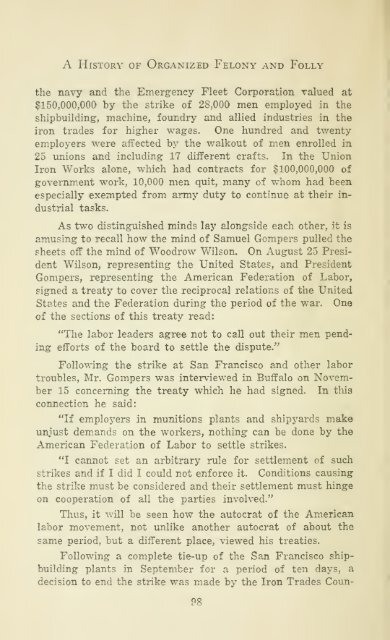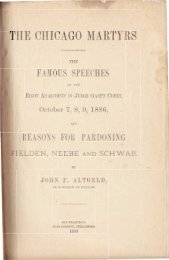A History of Organized Felony and Folly - The Clarence Darrow ...
A History of Organized Felony and Folly - The Clarence Darrow ...
A History of Organized Felony and Folly - The Clarence Darrow ...
Create successful ePaper yourself
Turn your PDF publications into a flip-book with our unique Google optimized e-Paper software.
A <strong>History</strong> <strong>of</strong> <strong>Organized</strong> <strong>Felony</strong> <strong>and</strong> <strong>Folly</strong><br />
the navy <strong>and</strong> the Emergency Fleet Corporation valued at<br />
$150,000,000 by the strike <strong>of</strong> 28,000 men employed in the<br />
shipbuilding, machine, foundry <strong>and</strong> allied industries in the<br />
iron trades for higher wages. One hundred <strong>and</strong> twenty<br />
employers were affected by the v/alkout <strong>of</strong> men enrolled in<br />
25 imions <strong>and</strong> including 17 different crafts. In the Union<br />
Iron Works alone, which had contracts for $100,000,000 <strong>of</strong><br />
government work, 10,000 men quit, many <strong>of</strong> whom had been<br />
especially exempted from army duty to continue at their in-<br />
dustrial tasks.<br />
As two distinguished minds lay alongside each other, it is<br />
amusing to recall how the mind <strong>of</strong> Samuel Gompers pulled the<br />
sheets <strong>of</strong>f the mind <strong>of</strong> Woodrow Wilson. On August 25 Presi-<br />
dent Wilson, representing the United States, <strong>and</strong> President<br />
Gompers, representing the American Federation <strong>of</strong> Labor,<br />
signed a treaty to cover the reciprocal relations <strong>of</strong> the United<br />
States <strong>and</strong> the Federation during the period <strong>of</strong> the war. One<br />
<strong>of</strong> the sections <strong>of</strong> this treaty read:<br />
"<strong>The</strong> labor leaders agree not to call out their men pending<br />
efforts <strong>of</strong> the board to settle the dispute."<br />
FolloT^'ing the strike at San Francisco <strong>and</strong> other labor<br />
troubles, Mr. Gompers was interviewed in Buffalo on Novem-<br />
ber 15 conceniing the treaty which he had signed. In this<br />
connection he said:<br />
"If employers in munitions plants <strong>and</strong> shipyards make<br />
unjust dem.<strong>and</strong>s on the workers, nothing can be done by the<br />
American Federation <strong>of</strong> Labor to settle strikes.<br />
"I cannot set an arbitrary rule for settlement <strong>of</strong> such<br />
strikes <strong>and</strong> if I did I could not enforce it. Conditions causing<br />
the strike must be considered <strong>and</strong> their settlement must hinge<br />
on cooperation <strong>of</strong> all the parties involved."<br />
Thus, it will be seen how the autocrat <strong>of</strong> the American<br />
labor movement, not unlike another autocrat <strong>of</strong> about the<br />
same period, but a different place, viewed his treaties.<br />
Following a complete tie-up <strong>of</strong> the San Francisco ship-<br />
building plants in September for a period <strong>of</strong> ten days, a<br />
decision to end the strike was made by the Iron Trades Coun-<br />
98
















